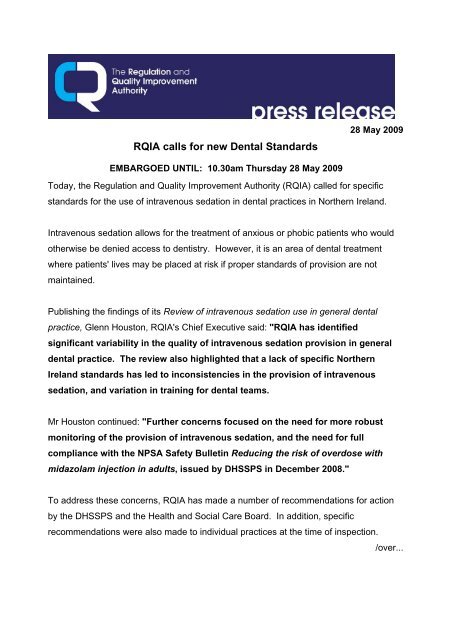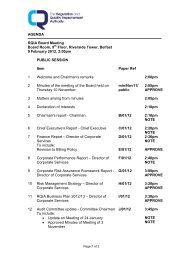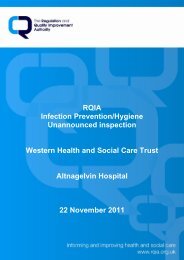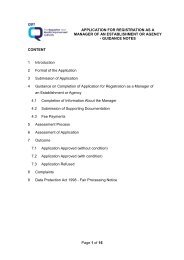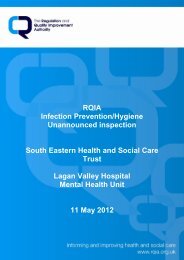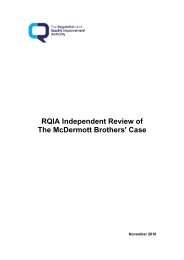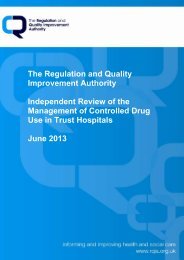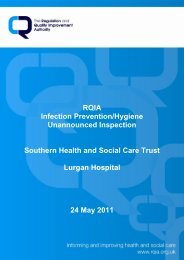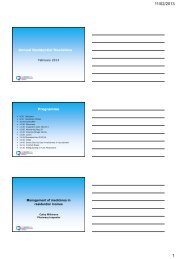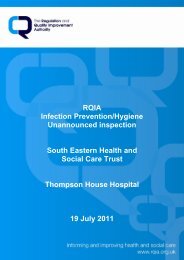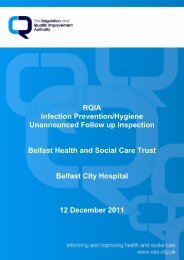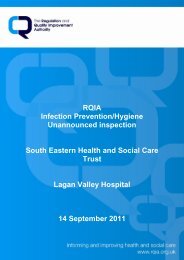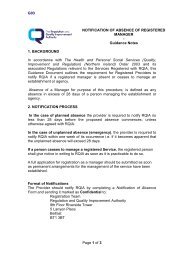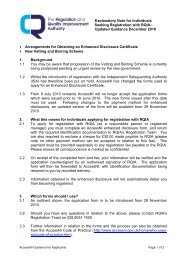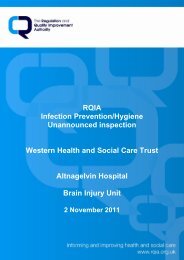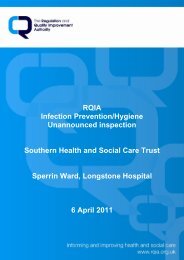RQIA calls for new Dental Standards - Regulation and Quality ...
RQIA calls for new Dental Standards - Regulation and Quality ...
RQIA calls for new Dental Standards - Regulation and Quality ...
You also want an ePaper? Increase the reach of your titles
YUMPU automatically turns print PDFs into web optimized ePapers that Google loves.
<strong>RQIA</strong> <strong>calls</strong> <strong>for</strong> <strong>new</strong> <strong>Dental</strong> <strong>St<strong>and</strong>ards</strong><br />
28 May 2009<br />
EMBARGOED UNTIL: 10.30am Thursday 28 May 2009<br />
Today, the <strong>Regulation</strong> <strong>and</strong> <strong>Quality</strong> Improvement Authority (<strong>RQIA</strong>) called <strong>for</strong> specific<br />
st<strong>and</strong>ards <strong>for</strong> the use of intravenous sedation in dental practices in Northern Irel<strong>and</strong>.<br />
Intravenous sedation allows <strong>for</strong> the treatment of anxious or phobic patients who would<br />
otherwise be denied access to dentistry. However, it is an area of dental treatment<br />
where patients' lives may be placed at risk if proper st<strong>and</strong>ards of provision are not<br />
maintained.<br />
Publishing the findings of its Review of intravenous sedation use in general dental<br />
practice, Glenn Houston, <strong>RQIA</strong>'s Chief Executive said: "<strong>RQIA</strong> has identified<br />
significant variability in the quality of intravenous sedation provision in general<br />
dental practice. The review also highlighted that a lack of specific Northern<br />
Irel<strong>and</strong> st<strong>and</strong>ards has led to inconsistencies in the provision of intravenous<br />
sedation, <strong>and</strong> variation in training <strong>for</strong> dental teams.<br />
Mr Houston continued: "Further concerns focused on the need <strong>for</strong> more robust<br />
monitoring of the provision of intravenous sedation, <strong>and</strong> the need <strong>for</strong> full<br />
compliance with the NPSA Safety Bulletin Reducing the risk of overdose with<br />
midazolam injection in adults, issued by DHSSPS in December 2008."<br />
To address these concerns, <strong>RQIA</strong> has made a number of recommendations <strong>for</strong> action<br />
by the DHSSPS <strong>and</strong> the Health <strong>and</strong> Social Care Board. In addition, specific<br />
recommendations were also made to individual practices at the time of inspection.<br />
/over...
<strong>RQIA</strong>'s Chief Executive concluded: "Due to the levels of concerns identified within<br />
this initial review, a full review of intravenous sedation use in general dental<br />
practice is to be undertaken by <strong>RQIA</strong> later this year."<br />
END<br />
For further in<strong>for</strong>mation, please contact:<br />
Malachy Finnegan, <strong>RQIA</strong> Communications Manager,<br />
Tel: 028 9051 7485,<br />
email: malachy.finnegan@rqia.org.uk<br />
website: www.rqia.org.uk<br />
Editors' notes<br />
About <strong>RQIA</strong><br />
The <strong>Regulation</strong> <strong>and</strong> <strong>Quality</strong> Improvement Authority (<strong>RQIA</strong>) is the independent body<br />
responsible <strong>for</strong> monitoring <strong>and</strong> inspecting the availability <strong>and</strong> quality of health <strong>and</strong><br />
social care services in Northern Irel<strong>and</strong>, <strong>and</strong> encouraging improvements in the<br />
quality of those services.<br />
What is conscious (intravenous) sedation<br />
This is defined as 'a technique in which a drug or drugs produces a state of<br />
depression of the central nervous system enabling treatment to be carried out, but<br />
during which verbal contact with the patient is maintained throughout the period of<br />
sedation. The drug <strong>and</strong> technique used to provide conscious sedation should carry<br />
a margin of safety, wide enough to render loss of consciousness unlikely.' (Skelly,<br />
A.M. Analgesia <strong>and</strong> Sedation, in Watkinson, A. & Adam, A. (Eds) Interventional<br />
Radiology. Ox<strong>for</strong>d: Radcliffe Medical Press, 1996: pp 3-11)<br />
Background to <strong>RQIA</strong>'s Review of intravenous sedation use in general dental<br />
practice<br />
"A Conscious Decision" (A review of the use of general anaesthesia <strong>and</strong> conscious<br />
sedation in primary dental care, Department of Health, July 2000) under the joint<br />
chairmanship of the Chief Medical Officer Sir Liam Donaldson <strong>and</strong> the Chief <strong>Dental</strong><br />
Officer Mr Robin Wild, recommended that when a general anaesthetic is<br />
considered necessary <strong>for</strong> dental treatment, it should be carried out in a hospital<br />
setting where there is the immediate availability of a critical care facility.<br />
In Northern Irel<strong>and</strong>, as a result of "A Conscious Decision", all general anaesthetics<br />
in general dental practice effectively ended on 31 December 2001. As a<br />
consequence there has been a growing use of conscious sedation in primary<br />
dental care settings <strong>and</strong> it is essential that where it is carried out, it is provided to<br />
the highest possible st<strong>and</strong>ards. Presently, however there are no specific Northern
Irel<strong>and</strong> st<strong>and</strong>ards or guidance <strong>for</strong> provision of intravenous sedation in general<br />
dental practice.<br />
<strong>RQIA</strong>'s review examined current practice in Northern Irel<strong>and</strong> through a sample of<br />
tem of the 41 general dental practices using this technique. The review involved<br />
an initial self assessment followed by a validation visit including expert reviewers<br />
<strong>and</strong> lay membership. The Review team made eight recommendations to the<br />
DHSSPS, NIMTDA <strong>and</strong> HSC Board, <strong>and</strong> recommendations were also made to the<br />
individual practices under review. Due to the levels of concerns identified within<br />
this sample of practices, a further review of intravenous sedation use in general<br />
dental practice is to be undertaken by <strong>RQIA</strong> later this year.<br />
Summary of recommendations<br />
The Review team made eight recommendations. These are:<br />
1. As a matter of urgency the DHSSPS should develop Northern Irel<strong>and</strong><br />
st<strong>and</strong>ards/guidance <strong>for</strong> the provision of conscious sedation in dental practice or<br />
make it clear to practitioners that another guidance document is taken as the<br />
expected st<strong>and</strong>ard.<br />
2. DHSSPS/NIMDTA should carry out a review focusing on the availability,<br />
appropriateness <strong>and</strong> st<strong>and</strong>ardisation of intravenous sedation training.<br />
3. Boards (HSC Board) must ensure that all dentists who carry out treatment using<br />
intravenous sedation are practising in line with the NPSA safety bulletin<br />
"Reducing the risk of overdose with Midazolam injection in adults".<br />
4. Boards (HSC Board) should ensure that all practices carrying out treatment<br />
using intravenous sedation have training in dealing with medical emergencies.<br />
Practices should also have access to an appropriate range of emergency<br />
equipment including AEDs (Automatic External Defibrillators)<br />
5. Boards (HSC Board) should develop a specific inspection protocol <strong>for</strong> dental<br />
practices that treat patients using intravenous sedation <strong>and</strong> carry out a<br />
separate, specific inspection of these practices.<br />
6. DHSSPS should implement a process <strong>for</strong> the regulation of private dentistry.<br />
7. Consideration should be given to the <strong>for</strong>mation of a "sedation peer group"<br />
perhaps through the peer review <strong>and</strong> clinical audit system.<br />
8. Although not recognised as a speciality by the GDC, DHSSPS should consider<br />
under <strong>new</strong> contractual arrangements only awarding contracts <strong>for</strong> the provision<br />
of intravenous sedation to those practices that can demonstrate that they meet<br />
appropriate st<strong>and</strong>ards.<br />
Review Team membership<br />
• Mr Barry Corkey BDS MSc MMedSc, Associate Specialist <strong>and</strong> Assistant<br />
Clinical Director, NHS Fife <strong>and</strong> Edinburgh Postgraduate <strong>Dental</strong> Institute<br />
• Miss Elizabeth Duffin OBE, Lay Reviewer<br />
• Mr Hall Graham BDS FDSRCPS MSc, <strong>RQIA</strong> Head of Primary Care Review<br />
• Mr Sean Brown, <strong>RQIA</strong> Project Manager <strong>RQIA</strong>


